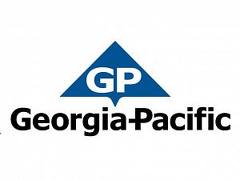 Georgia-Pacific LLC was founded in 1927 as the Georgia Hardwood Lumber Company. Now, after years of expanding and acquisitions, Georgia Pacific is one of the world’s leading manufacturers and distributors of tissue, pulp, paper, toilet and paper towel dispensers, packaging, building products and related chemicals. Georgia Pacific, an American pulp and paper company based in Atlanta, Georgia, is also a named defendant in a multitude of asbestos cases. From 1965 through 1977 Georgia-Pacific used asbestos to create a building products compound used for hanging wallboard and finishing ceilings.
Georgia-Pacific LLC was founded in 1927 as the Georgia Hardwood Lumber Company. Now, after years of expanding and acquisitions, Georgia Pacific is one of the world’s leading manufacturers and distributors of tissue, pulp, paper, toilet and paper towel dispensers, packaging, building products and related chemicals. Georgia Pacific, an American pulp and paper company based in Atlanta, Georgia, is also a named defendant in a multitude of asbestos cases. From 1965 through 1977 Georgia-Pacific used asbestos to create a building products compound used for hanging wallboard and finishing ceilings.
By 2001 the company had approximately 63,000 pending asbestos injury claims, which soon became the biggest issue clouding the company’s future. By 2004 the company had set aside over $100 million dollars in a ten-year defense fund. In that year alone Georgia-Pacific paid out $200 million dollars to resolve claims, an 11-million-dollar increase from 2003, when claim payments totaled 189 million. By January of 2005 Georgia-Pacific faced approximately 344,300 asbestos claims, costing the company a total of $830 million. It was during 2005 and in response to the overwhelming, rapidly increasing number of asbestos claims, that the company funded a series of studies testing the harmful effects of an asbestos containing joint compound that they previously manufactured. Findings were subsequently published in a series of articles. Eleven papers, published in the journals Inhalation Toxicology, the Journal of Occupational and Environmental Hygiene, the Annals of Occupational Hygiene and Risk Analysis were referred to in court depositions by GP’s Stewart Holm, as “litigation-driven research.”
Stewart Holm, Georgia-Pacific’s own director of toxicology and chemical management, co-authored the majority of the articles and consulted extensively on those that he did not. Georgia Pacific’s own in-house counsel reviewed the articles before they were published and actually recommended revisions. The problem stems from the fact that the studies did not disclose Georgia-Pacific’s involvement in their creation, and two of them falsely claimed “[GP] did not participate in the design of the study, analysis of the data, or preparation of the manuscript.”
Five New York judges ruled that Georgia Pacific must allow a private inspection of the documents and data related to eleven scientific articles that were financed by Georgia Pacific and meant to cast doubt on the harmful effects of Chrysotile asbestos. Although Georgia Pacific argued that the documents were attorney-client privilege, the Court determined that it fell under the crime-fraud exception to attorney-client privilege. The crime-fraud exception applies when legal services are solicited to commit a crime or fraud. The Court also said the data underlying the studies was not privileged and should be produced. There were sufficient extenuating circumstances to warrant a closer inspection of the documents.
 REFERENCES:
REFERENCES:
hazards magazine: Dust storm – “Crime fraud allegations cloud conference
The Daily Report: Georgia-Pacific Told To Hand Over Documents In N.Y Asbestos Case















